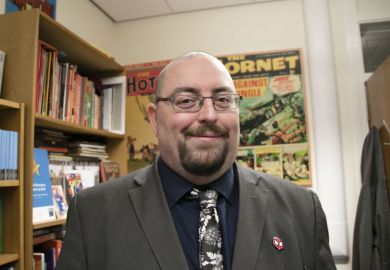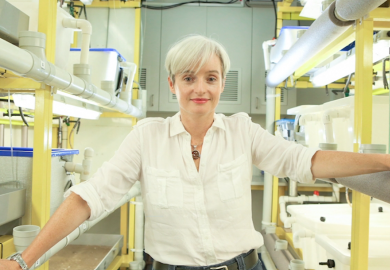Louis Taillefer is a Canadian quantum physicist and holder of the Canada chair in quantum materials at the Université de Sherbrooke in Quebec. An expert on superconductivity, Professor Taillefer is also director of the quantum materials programme at the Canadian Institute for Advanced Research (CIFAR). Earlier this month, he was named winner of the Institute of Physics’ 2017 Simon Memorial Prize, recognising distinguished work in experimental or theoretical low-temperature physics. He is the first Canadian to receive the prize since it was established in 1957.
Where and when were you born?
Montreal, Canada, on 28 October 1959.
How has this shaped you?
To have grown up in an environment where two different cultures coexisted peacefully (at least after the age of fierce snowball fights) opened my mind to the richness of diversity. It made me tolerant and inclined to cooperate and showed me the value of complementarity.
What is the significance of winning such an award?
For me personally, it is a clear message that my peers have a high opinion of my research accomplishments. It’s a great feeling. It also helps to get grants from funding agencies, because a prize is a clear indicator of the excellence that a selection committee looks for. For my university, I think having one of its professors win an international award is a particularly effective way to shine, and it helps to attract students, donations [and] grants. Finally, for the public, this is like a Canadian winning a medal at a world championship in some sport – it says that we have top scientists in Canada who excel in their field.
Many Simon Memorial prizewinners have gone on to become Nobel laureates in physics. Feel any pressure?
Not pressure, no. A Nobel prize is not something you can aim for. It just happens to those who find a path that leads them to a huge breakthrough, which becomes like a tidal wave they surf: much bigger than themselves. One way to get a Nobel prize in superconductivity is to achieve room-temperature superconductivity. That’s my holy grail.
What is the biggest misconception about your field of study?
That it has no practical use. Discoveries made at the frontier of knowledge are not guided by their usefulness. They result from the passionate exploration of researchers. But then, they can indeed spark major revolutions, technological or otherwise. Think of general relativity, the laser, the transistor. Of what use were these when they were first conceived? No one could predict, when in the making, where these inventions would lead.
One of CIFAR’s core principles is international collaboration. How important is this in the global research community?
In most research fields, certainly in my own of materials physics, collaboration is essential. Almost invariably, discoveries come from bringing together people with different, complementary types of expertise. In my own career, all of my (our!) discoveries were the fruit of a collaboration. The expert you need will [often] not reside in your own country, so the whole idea of collaboration immediately becomes global; it is the natural way of scientific collaboration. CIFAR is a powerful agent of cooperation. The researchers are no longer identified as Japanese, Chinese, German, French, American or Canadian – they are members of the same scientific family. If I were to move to the US or to France, for example, I would still be a member of my CIFAR family.
Do you think science research is chronically underfunded by governments?
Most governments are reluctant to fund fundamental research because they focus on short-term benefits. What I think is really underfunded and disastrously undervalued, however, is school – the education of children. There should be a massive budget shift from healthcare to education. The social status of a schoolteacher should be much higher than it is: as high as that of a medical doctor, or higher. Everything rests on the shoulders of schoolteachers.
If you were the Canadian higher education minister for a day, what policy would you immediately introduce to the sector?
I would launch a programme called the “Canada research chairs for women in science and engineering” – with money for 1,000 chairs: 300 senior chairs and 700 junior chairs – to seriously increase the number of female professors in Canadian universities, in science and engineering.
What’s your biggest regret?
I don’t really have regrets…except perhaps one: not having played a game of chess with a dear friend who died too quickly.
What kind of undergraduate were you?
I liked to excel, and I worked hard. But what I remember most vividly from my undergraduate days has nothing to do with physics or science. I remember the summer I spent in northern Saskatchewan fighting forest fires and prospecting for uranium, or discovering Japanese culture in Vancouver as a summer intern at the University of British Columbia. I went on an expedition to the Arctic. I took ballet lessons. I worked on a farm. My interest was not in academic pursuits – I was busy exploring the world out there, and relationships. My interest in science awoke only when I started to do research at [the University of] Cambridge, aged 24 or so, and I first tasted the thrill of experimental discovery.
What advice would you give to your younger self?
Learn to develop your intuition sooner. Listen to it more carefully. And follow it more boldly.
What advice do you give to your students?
Love your data! Feel what secrets they are trying to reveal. Therein lies a treasure. To be the first human ever to witness a physical phenomenon – even if it is a slight variation on a well-known theme – is an incredible feeling. The scientific exploration of our world is the most beautiful and noble of human endeavours.
Francisco Veloso, a leading authority on innovation and entrepreneurship, has been appointed the new dean of Imperial College Business School. Professor Veloso joins from the Católica Lisbon School of Business and Economics, Portugal’s leading business school, where he has been dean since 2012. He will take up his new position in August. Under his leadership, Católica Lisbon has become an internationally recognised institution, now ranking among the Financial Times’ top 25 business schools in Europe. Expressing his delight at joining Imperial, Professor Veloso said: “The school has achieved so much in its short history and is uniquely positioned for the future. The growing importance of technology-driven innovation and entrepreneurship across all business areas and fields is creating opportunities that fall squarely into the school and college strengths.”
Sherria Hoskins, who has been interim dean of the University of Portsmouth’s Faculty of Science since summer 2016, has taken up the role on a permanent basis. She was previously head of the department of psychology for seven years, and is an invited Fellow of the Royal Society of Arts and a principal fellow of the Higher Education Academy. Portsmouth has also appointed Trevor Keeble, currently executive dean (learning, teaching and research) at the University for the Creative Arts, dean of the Faculty of Creative and Cultural Industries. He will take up his position in May.
Mary O’Neill has become dean of the School of Science and Technology at Nottingham Trent University, joining from the University of Hull.
Robert Gordon University has made three senior appointments to its leadership team: Jan Cutting has joined as vice-principal for commercial and regional engagement; Mark Sollis has become vice-principal for university advancement; and Vicki Nairn has been made vice-principal for corporate operations.
POSTSCRIPT:
Print headline: HE & me
Register to continue
Why register?
- Registration is free and only takes a moment
- Once registered, you can read 3 articles a month
- Sign up for our newsletter
Subscribe
Or subscribe for unlimited access to:
- Unlimited access to news, views, insights & reviews
- Digital editions
- Digital access to THE’s university and college rankings analysis
Already registered or a current subscriber?







